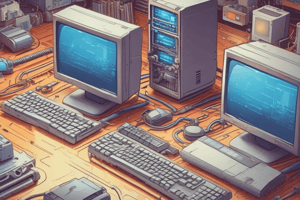Podcast
Questions and Answers
What is the main function of a computer operating system?
What is the main function of a computer operating system?
- Acting as an intermediary between users and hardware (correct)
- Managing hardware components
- Handling application software
- Interacting with computer users
Which part of the operating system includes the CPU, memory, and I/O devices?
Which part of the operating system includes the CPU, memory, and I/O devices?
- Application Software
- Hardware Components (correct)
- Computer Users
- System Software
What is the role of application software in the computer operating system?
What is the role of application software in the computer operating system?
- Managing the operating system
- Handling hardware components
- Handling everything inside the computer (correct)
- Interacting with computer users
Which part of the operating system includes tools like compilers and assemblers?
Which part of the operating system includes tools like compilers and assemblers?
What is the essential intermediary role of system software in the computer operating system?
What is the essential intermediary role of system software in the computer operating system?
What is one of the key functions of operating systems?
What is one of the key functions of operating systems?
Which type of operating system allows for the processing of multiple computer programs simultaneously?
Which type of operating system allows for the processing of multiple computer programs simultaneously?
What is the difference between UEFI and BIOS in the context of operating systems?
What is the difference between UEFI and BIOS in the context of operating systems?
What is the primary role of a command interpreter in an operating system?
What is the primary role of a command interpreter in an operating system?
In the context of operating system advancements, what do real-time multithreading and multiprocessing contribute to?
In the context of operating system advancements, what do real-time multithreading and multiprocessing contribute to?
Study Notes
Introduction to Computer Operating Systems
A computer operating system (OS) is a crucial intermediary between computer users and the computer's hardware, serving as a bridge that allows users to interact with and make the most of their computer systems for various tasks and purposes. In this article, we will explore the essential aspects of computer operating systems, focusing on their structure, key components, and main functions.
Operating System Structure
An operating system is composed of several key parts, including:
- Computer Users: These individuals interact with the computer system, using it for various tasks and purposes.
- Application Software: This software handles everything inside the computer, acting as an intermediary between users and the computer's hardware.
- System Software: This includes the operating system and other tools like compilers and assemblers.
- Hardware Components: These are the physical components that make up the computer, such as the CPU, memory, and I/O devices.
Key Functions of Operating Systems
Operating systems perform various essential tasks, including:
- Organizing files
- Managing memory
- Overseeing processes
- Handling input and output operations
- Controlling external devices like hard drives and printers
- CPU scheduling
- Process synchronization
- Deadlock management
- File and disk management
- Network management
- Security management
- Command interpreter
Types of Operating Systems
There are various types of operating systems, each with its own unique features and characteristics. Some popular examples include:
- Windows
- macOS
- Linux
- iOS
- Android
- Ubuntu
- CentOS
- Solaris
- Chrome OS
- Fedora
Operating System Advancements
Over the years, operating systems have evolved significantly, becoming more efficient and capable in managing computer resources. Some of the key advancements include:
- Multiprocessor systems, which allow for the processing of multiple computer programs simultaneously
- Real-time multithreading and multiprocessing, which improve system performance and responsiveness
- Types of computer memory (RAM and ROM)
- Difference between UEFI (Unified Extensible Firmware Interface) and BIOS (Basic Input/Output System)
Conclusion
In conclusion, operating systems play a vital role in the functioning of computer systems, managing hardware and software resources to ensure smooth and efficient operation. As technology continues to advance, operating systems will likely continue to evolve, adapting to new challenges and opportunities in the world of computing.
Studying That Suits You
Use AI to generate personalized quizzes and flashcards to suit your learning preferences.
Description
Explore the essential aspects of computer operating systems, including structure, key components, main functions, types, and advancements. Learn about the intermediary role of operating systems in enabling user-computer interaction and efficient resource management.




